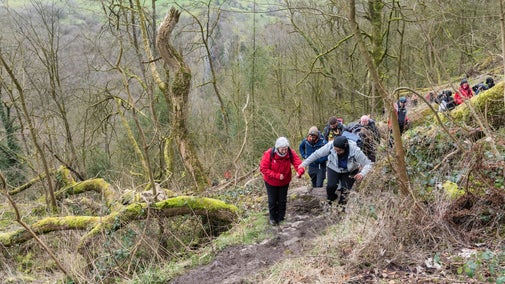
Discover more at the Yorkshire Dales
Find out how to get to the Yorkshire Dales, where to park, the things to see and do and more.

We all know that our wildlife is facing a serious challenge, and we are working hard to make improvements for our amazing habitats and species. Many of these are found on farmed land and we have accordingly made nature-friendly farming a priority.
In the Yorkshire Dales we are working with National Trust farm tenants to trial a new approach to payments for methods of farming which result in a better outcome for the environment.
Many farmers are already managing their land in a way that benefits wildlife and our trial will build on that enthusiasm and knowledge.
Current payments for environmentally-friendly farming require specific management methods, but we are putting the emphasis on the outcomes for the environment – often called a ‘results-based’ approach.
We provide training and advice to farmers on more sustainable ways of managing their land, but the idea is that they use their own knowledge to achieve more for nature. The better the outcome for nature: the higher the payment.
Our focus is on soils and pollinators which are crucially important for productive farming and our ecosystems, so healthier soils and better habitats for pollinators are a win-win.

Farmers have played a central role in the trial, taking part in monitoring, telling other farmers what it’s been like to take part, and providing feedback about what works and what doesn’t.
We have also been able to draw on the expertise of other organisations, such as the Yorkshire Dales National Park Authority, which has valuable experience of this results-based approach to environmental payments for agriculture. Our work on developing outcomes for pollinators has also benefited from input from the charity Buglife.
Specialist advice, detailed feedback from farmers and the analysis of the field surveys will feed into our conclusions about the trial, which is due to end at some point this year.
We will share our findings widely, including with policy makers, because we hope that this approach can be a way forward for government-funded schemes in the future.
With your ongoing support, we're able to continue our vital conservation work. Thank you for helping to protect these special places.

Find out how to get to the Yorkshire Dales, where to park, the things to see and do and more.

Discover the Yorkshire Dales with their rolling countryside, steep-sided valleys, heather-covered moorland and a patchwork of dry stone walls and barns.

Discover the best walking, running and cycling routes around the Yorkshire Dales.

The Yorkshire Dales is very dog friendly, and with miles of footpaths to explore, trees to sniff and grass to roll in, your four-legged friend should have a great day.

Read about our strategy 'For everyone, for ever' here at the National Trust, which will take the organisation through to 2025.

We believe that nature, beauty and history are for everyone. That’s why we’re supporting wildlife, protecting historic sites and more. Find out about our work.